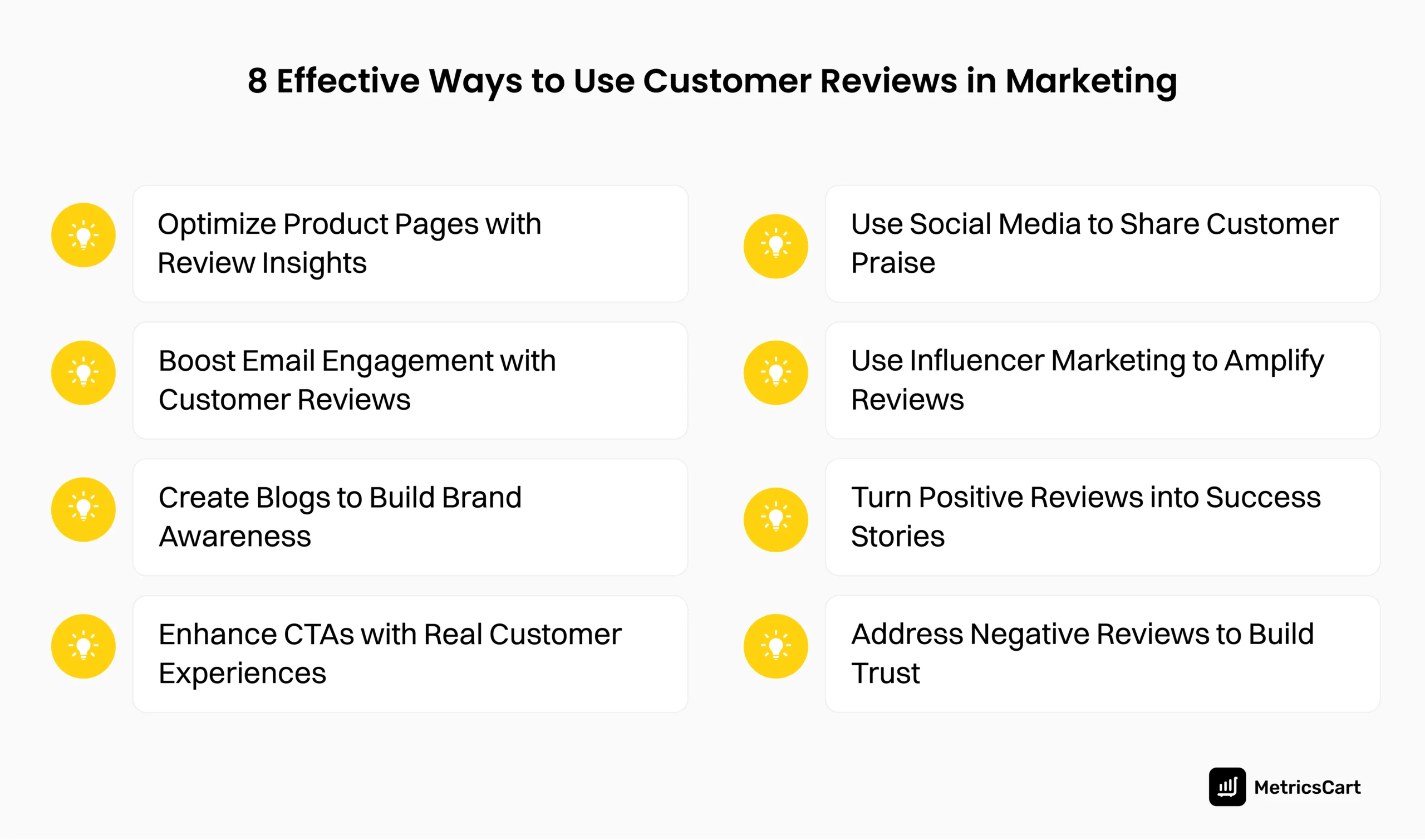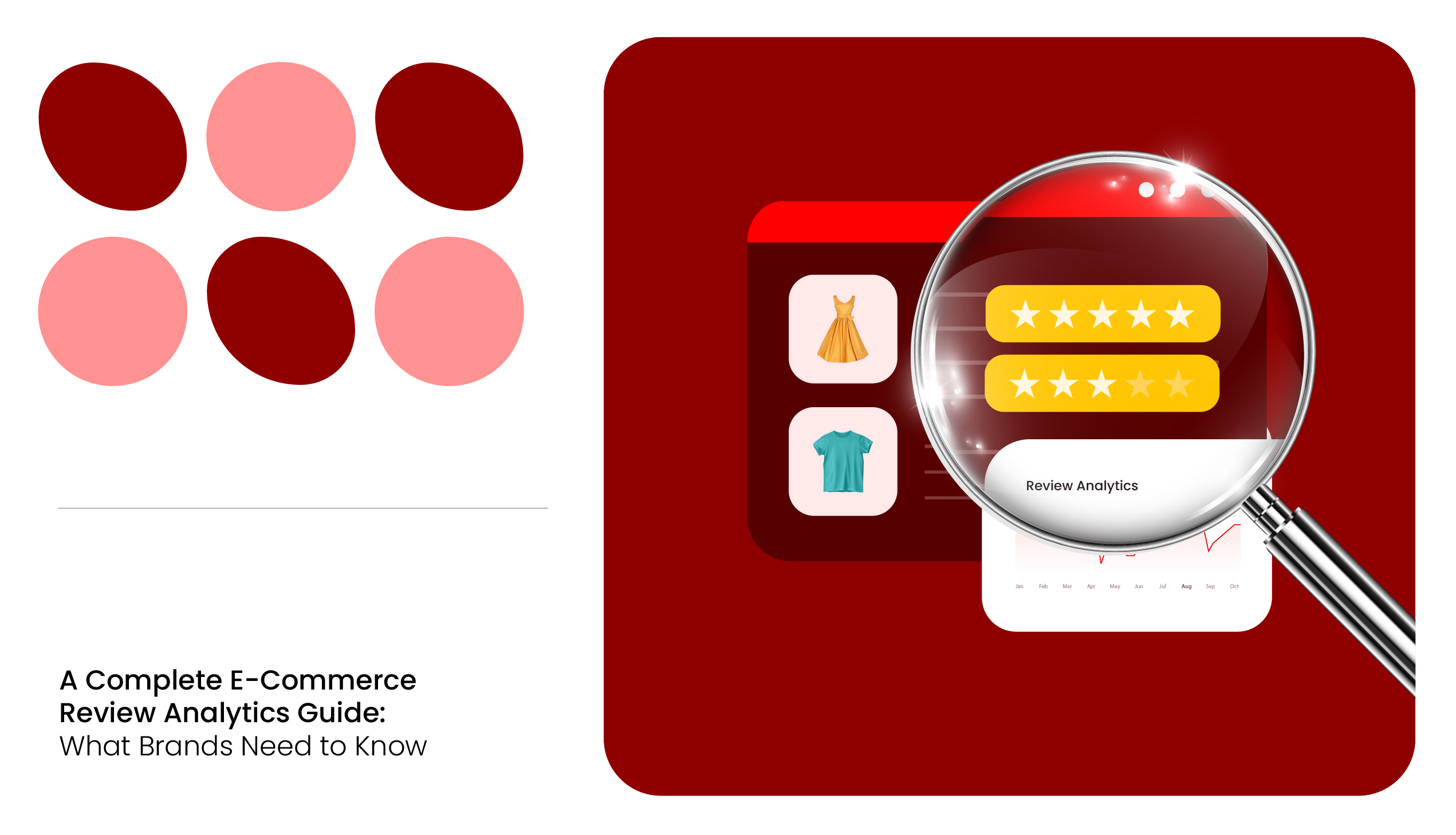Today’s shoppers trust customer feedback just as much as personal recommendations. That’s why reviews aren’t just comments; they’re powerful marketing tools that can build trust, influence decisions, and even boost sales.
But here’s the catch: it’s not just about collecting reviews—it’s about using them strategically. From featuring testimonials in ads to optimizing product pages with real customer insights, brands that harness the power of reviews in marketing stand out. Even negative feedback, when handled well, can make your brand look more authentic and customer-focused.
That’s where MetricsCart’s review monitoring software comes in. It helps brands analyze customer sentiment, spot trends, and turn insights into action.

Optimize Product Detail Pages with Review-Driven Insights
Customer reviews play a crucial role in shaping buying decisions, and integrating them into your Product Detail Page (PDP) can significantly enhance your marketing strategy. Consumers are 92% more likely to trust their peers when it comes to purchasing decisions.
By showcasing reviews on your PDP, you offer authentic social proof that validates your product’s quality and performance. So, how can brands use reviews in PDPs? One way is to display the star ratings to signal product quality prominently.
Moreover, pulling key phrases from top reviews—such as “Great Durability” or “Perfect Fit”—helps highlight your product’s strengths and unique selling points. Additionally, incorporating customer language into product descriptions enhances relatability and persuades potential buyers.
To further boost authenticity, you can encourage customers to upload photos and videos with their reviews. This visual content reinforces trust and helps shoppers visualize the product in real-life settings. Ultimately, a well-curated display of positive reviews on your PDP can drive higher conversion rates and elevate your overall marketing strategy.
READ MORE | Want to Optimize the PDPs Effectively? Check out E-Commerce Product Page Optimization: Tips and Examples
Increase Email Engagement by Featuring Customer Reviews
Emails that showcase real customer experiences have proven to increase click-through rates. By incorporating customer testimonials, ratings, or review snippets, you create a more personalized and credible message.
Marketing professionals can use these testimonials in newsletters, promotional offers, and even abandoned cart emails. For instance, featuring reviews in abandoned cart emails will remind hesitant shoppers why they should complete their purchase by including positive testimonials about the product they left behind.
In addition, when introducing a new product or running a special offer, including customer feedback from similar items, such as “Loved by thousands—now available at 20% off!”, helps build confidence.
By strategically placing testimonials in key email campaigns, you can create a more compelling message that resonates with your audience.
Create Blogs to Build Brand Awareness
Brands can leverage reviews to create engaging, SEO-driven content that builds trust and attracts potential customers. They can create comparison blogs and present a side-by-side analysis of their products versus competitors.
By incorporating customer feedback, they can highlight key advantages and address concerns, helping potential buyers make informed decisions.
In addition, user-generated lists and quotes are also valuable in blog content. Featuring snippets of tracking reviews in “Best Of” or “Top-Rated” lists enhances credibility and engagement. Customers trust peer recommendations, and incorporating these into blogs can boost conversions.
Moreover, brands can address pain points by analyzing common complaints in reviews. Writing solution-focused blog posts that directly respond to these concerns reassures potential buyers and positions the brand as customer-centric.
Reviews naturally contain keywords that potential customers search for, and including them in blog content improves search engine rankings and increases organic visibility. By integrating honest customer feedback into a blog strategy, brands can enhance credibility, drive traffic, and improve engagement while reinforcing trust in their products.
Strengthen CTAs by Showcasing Real Customer Experiences
Placing customer reviews near your calls to action (CTAs) can have a significant impact on conversion rates. When visitors see a positive review with a star rating and a short, impactful quote right next to a “Buy Now,” “Add to Cart,” or “Sign Up button, it reinforces their decision and encourages immediate action.
It also helps eliminate doubts at the final stage of the buyer’s journey. This simple tactic leverages the power of social proof and provides reassurance to potential customers.
Leverage Social Media to Amplify Customer Praise
Social media platforms are excellent channels for sharing user-generated content. Reviews shared on social platforms result in conversion rates that are 8.4 times higher for X, and 40 times higher for Facebook.
Brands can repost customer reviews, create short video testimonials, or design visually appealing graphics that highlight star ratings under branded hashtags.
You can use Instagram and Facebook Stories to share customer feedback in real time. In addition, you should create dedicated “Testimonials” or “Customer Love” Highlights to make these reviews easily accessible.
In addition, you can encourage customers to share their own photos or videos alongside their feedback and run contests or giveaways where users tag your brand with their testimonials. This not only increases engagement but also broadens brand reach organically.

Use Influencer Marketing to Amplify Reviews
Influencers and content creators play a crucial role in amplifying customer reviews and generating brand awareness. By partnering with them, brands can extend the reach of authentic testimonials.
Brands can collaborate with influencers to create “Honest Review” videos, unboxings, or testimonial-style posts that repurpose customer feedback in an engaging format. They can showcase real customer testimonials in their posts, reinforcing brand credibility. Seeing positive experiences from both influencers and customers builds trust among potential buyers.
Brands can also run engagement-driven campaigns where influencers encourage their followers to share their own experiences in the comments. This approach generates more user-generated content and increases brand interaction.
Influencer marketing ensures that customer reviews don’t just stay on product pages—they reach wider audiences across platforms like Instagram, YouTube, and TikTok, driving more engagement and trust.
Transform Positive Reviews into Compelling Success Stories
While short testimonials are impactful, turning them into detailed case studies or success stories adds depth and credibility to your brand. A well-crafted case study goes beyond a simple positive review—it narrates a customer’s journey, highlighting their pain points, how your product solved them, and the measurable results they achieved.
A well-structured success story allows you to highlight your brand’s unique value proposition in a way that resonates with your target audience. This method not only humanizes your brand but also provides potential customers with relatable examples of success.
Address Negative Reviews to Build Credibility and Trust
Many brands fear negative reviews, but ignoring them can do more harm than good. Responding to negative reviews shows that you listen to customers, value their experiences, and are committed to continuous improvement.
Consumers today research before making a purchase, and they don’t just look at five-star ratings—they also check how brands respond to criticism. In fact, over 99.9% of customers read reviews when they shop online. 96% of customers specifically look for negative reviews.
Negative reviews, when handled correctly, offer a unique opportunity to build trust. It shows that your brand values feedback and is committed to improvement. This transparency can convert a potentially negative situation into a demonstration of excellent customer service, enhancing overall brand reputation.
Conclusion
If you’re still treating customer reviews as a checkbox on your to-do list, you’re missing out—big time. While most brands recognize their importance, many aren’t tapping into the full power of customer feedback. The real magic happens when you dive deep, analyze the nuances, and pivot your marketing strategies based on what your customers are telling you.
MetricsCart’s platform is designed to do exactly that. It’s about harnessing the voice of your customers to build credibility, refine your offerings, and outpace the competition.
Unlock Valuable Customer Insights with Our Review Analysis.
FAQs
They build trust, provide social proof, and offer insights that can refine product descriptions and marketing messages.
Use digital shelf analytics tools like MetricsCart to monitor reviews across platforms, analyze sentiment, and track key trends.
Yes. Fresh, user-generated content like customer reviews can improve your site’s SEO and boost search engine rankings.
Address them promptly and professionally. Acknowledge the issues raised, apologize, and explain the measures being taken to resolve them.
Customer reviews add fresh, user-generated content to your website. This content helps search engines understand the relevance and trustworthiness of your pages, leading to better organic search rankings.







